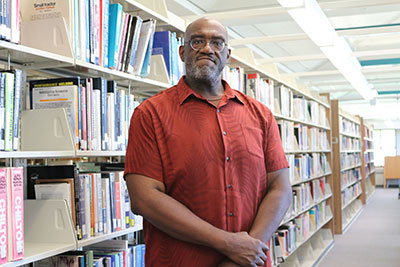
AVC Profile: Dr. Scott Lee

Dr. Scott Lee, chosen by his colleagues as Antelope Valley College’s Scholar in Residence for 2017-18, comes from a long line of educators dating back to an ancestor who helped build the first school for African American children in Washington, D.C. 200 years ago.
Yet, when Scott was deciding on career options as a young man, education wasn’t one of his choices. Scott wanted to pursue filmmaking instead.
He studied filmmaking at Montana State University in Bozeman, graduating with a bachelor’s degree in media and theater arts.
Even then, however, he had leanings toward being an educator. “I was the classmate who would be teaching other classmates how to do stuff,” he said.
While some of his fellow graduates went to Southern California to pursue film careers, Scott returned to his native Washington, D.C. where he had a three-week stint as a laborer for the 1993 movie “The Pelican Brief.”
“I got paid very well. We were part of the carpenters’ union,” he said.
It was at that point he started “branching out in other areas,” first as an audiovisual technician, then as a document coder.
In 1994, he secured a position as a librarian for the District of Columbia Public Library and enrolled in a master’s degree program in library science. Several years later – after libraries made the jump into the digital age - he was hired as a technology trainer for the Sacramento public library, which proved to be a good fit for Scott’s long-term interest in computer technology. (He’d earned certification as an A+ certified computer technician many years prior).
It was then, “I started realizing I wanted to get into education,” Scott said. The switch to education seemed like a natural fit.
Scott’s family members have long been involved in education. It was one of his ancestors, Moses Liverpool, who, along with two other freed slaves, helped establish the Bell School in 1807. Scott’s grandfather taught woodshop and carpentry in a vocational school. Scott’s mother, with a bachelor’s degree in chemistry from Howard University and a master’s from The George Washington University, taught math and science at a middle school.
Scott made the transition to education in 2001 when a friend told him of a job opening for a part-time librarian at the Antelope Valley College Library. He left his full-time position in Sacramento to accept the adjunct job at AVC.
“Sometimes you just have to take a risk,” Scott said. The risk paid off for Scott. A few months later, he applied for a full-time job as AVC’s information competency librarian and was hired.
It seems a fitting tribute to his great ancestor Moses Liverpool, that Scott has taught thousands of students to learn and pursue their educational goals through information literacy. Moses and his two colleagues, who all worked as caulkers at a Navy Yard, realized the value of education. They were able to open the Bell School after they found a white teacher willing to teach black students, according to Scott.
Information literacy consists of teaching students research skills and how to use Internet search engines effectively. Information literacy is a valuable skill and one that has expanded beyond Scott to include other AVC librarians.
“We probably have more librarians doing for-credit courses than any community college in California,” Scott says.
Part of what Scott tries to convey to students is how to separate legitimate information from “fake news” sources.
Along with the widespread use of the Internet have come an ever-expanding number of information sources – some of which aren’t reliable.
“It’s easier to get access to information, but is it good information?” Scott asked. “Who is it who produced this information? Where does it come from? Can I trust them?”
Scott points to Wikipedia, the online encyclopedia, as an example.
“A lot of students can’t understand why faculty (members) don’t like Wikipedia. Wikipedia is all anonymous. That drops its value and its trust. Anybody can put anything on Wikipedia,” he said. Legally, he said, Wikipedia is merely an Internet service provider, not a publisher or an author.
Fake news, he said, isn’t based on any actual facts or, at best, has a lot of fiction built around a few facts.
For his years of commitment to students and service to his profession, Scott was selected for AVC’s highest honor for faculty members, Scholar in Residence. He has received a stipend and will conduct a public presentation as part of the honor. In addition to teaching, Scott has served on numerous education committees at the local and state level, has worked with student clubs on campus, has had numerous articles published and contributed a chapter to a book, and currently serves as president of AVC’s faculty union.
Scott said going to the University of California, Los Angeles to earn a doctorate in educational leadership has helped him as an instructor.
“It was very valuable for me. Being a student again…helped me to reconnect with what my students are trying to do and it reignited my passion for learning,” he said. “Good teachers are good learners.”